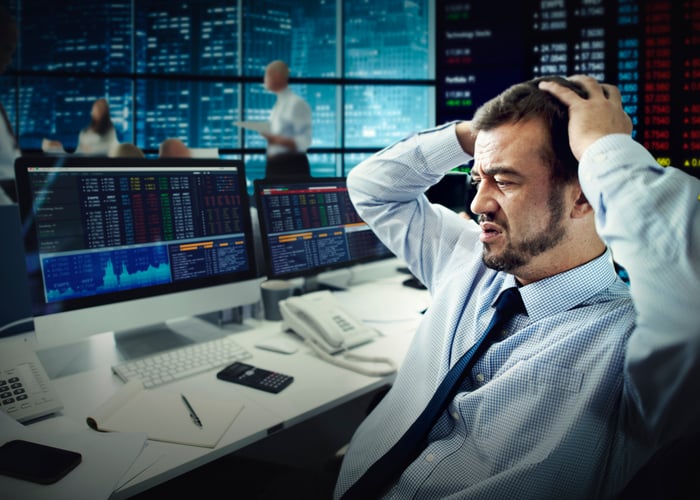We don't get to say this too often, but Valeant Pharmaceuticals (BHC -0.69%) was a standout performer during Monday's trading session. Shares of the embattled drugmaker moved higher by 6.4%, though they're still about 95% lower from where they were nearly two years ago.
Valeant's gets a new boardmember
What lit a fire under Valeant's stock, you ask? According to a press release well before the stock market opened, the company announced that John Paulson, the brainchild behind Paulson & Co., whose firm is Valeant's largest shareholder, was joining its board of directors. Said Paulson, "The strategic plan to transform Valeant smartly focuses on rebuilding the company's core franchises in ophthalmology, dermatology and gastroenterology while simultaneously using the proceeds from the sale of non-core assets and operating cash flow to de-lever the company. I am fully supportive of the strategy and leadership team at Valeant."

Image source: Getty Images.
Paulson has a large vested interest in Valeant's success, so shareholders are clearly viewing his presence on the board as another factor that'll tie their investment focus with that of Valeant's management team. Paulson is also well-known for his investing prowess, having made a fortune during the Great Recession by making many successful bets on credit default swaps. A big name becoming even more prominent by joining Valeant's board is believed by some on Wall Street to be a good thing.
A real head-scratcher: Why is Valeant up on this news?
As for this Fool, I believe Paulson joining Valeant's board is a relative non-event, and Monday's press release isn't a sufficient reason for Valeant to have tacked on $282 million in market value. Let's look at Paulson's track record first, and then we'll get into the nitty-gritty of why his addition to the board isn't going to fix Valeant.
Paulson, while having great success during and shortly after the Great Recession, has been trying to catch falling knives in the healthcare sector in recent years. Paulson's Valeant investment has reportedly cost the mogul's fund nearly $2 billion.
What's more, Bloomberg data, which estimated Paulson's average cost basis based on 13F filings with the Securities and Exchange Commission, suggests that Paulson is losing money on eight out of his nine largest healthcare holdings. This includes nearly a 90% decline in the price of Valeant, a nearly 80% implosion by Endo International, and a veritable halving in price from branded and generic drugmaker Teva Pharmaceutical Industries. Again, this data is estimated, but it pretty clearly demonstrates that Paulson's healthcare intuition hasn't been the greatest over the past couple of years. The old adage, "Past performance is no guarantee of future results," is on display here.

Image source: Getty Images.
Additionally, hedge funds are at least partly responsible for Valeant's current mess. Bill Ackman's hedge fund, Pershing Square Capital Management, was previously Valeant's largest shareholder, and Ackman was perhaps its biggest cheerleader. Ackman encouraged the previous management team's strategy of growth by acquisition, which including piling on debt to acquire new businesses, and using its pricing power to lift the list prices of mature drugs. In other words, having another hedge-fund mogul involved shouldn't exactly excite investors.
Good luck solving Valeant's EBITDA problem
However, the real issue is that adding Paulson to the board isn't exactly going to reignite Valeant's core businesses or resolve its pressing debt and EBITDA (earnings before interest, taxes, depreciation, and amortization) issues.
In Valeant's first-quarter press release, we did see a few modest improvements in the Bausch & Lomb business. Sales on a constant currency basis rose 4%, which is pretty close to the company's full-year estimate that calls for 5% to 7% constant currency growth. But, that was about it when it came to positive news.
For instance, the company's branded prescription segment, which includes Salix Pharmaceuticals, saw sales dip 9%. Mind you, this is a core segment that the company forecast would grow by 2% to 5% in 2017. Valeant's management team continues to seek the patience of Wall Street and investors while it attempts a turnaround, yet it has not clearly laid out the groundwork of how it's going to regain physician, consumer, and insurer trust, or invigorate sales for Salix Pharmaceuticals.
Valeant's debt is also a major concern. At its peak, Valeant had north of $32 billion in debt, but has since paid down $3.6 billion to $28.54 billion as of the end of the first quarter. But there are two particular concerns about this reduction.

Image source: Getty Images.
To begin with, the company is almost entirely reliant on asset sales for debt-reduction purposes. As long as Valeant can sell its assets for an acceptable premium this isn't an issue, but it's had a very difficult time getting its asking price for most of its chopping-block assets. Meanwhile, there's been very little in the way of paying down utilizing its operating cash flow. In other words, if Valeant can't sell its assets for an attractive price, its debt load isn't going to be reduced much, if at all, by organic means.
The second issue is that paying down its debt doesn't cure its debt covenant concerns. Valeant's secured lenders closely monitor its EBITDA in relation to the fees and interest it incurs to service its debt as a measure of how "safe" their loans are. This EBITDA-to-interest coverage ratio was at one time well over 3-to-1. As of the first quarter, it had dipped to just 1.83-to-1, which is worryingly low. Valeant's asset sales reduce its debt, but they also lower the company's EBITDA. Without a healthy premium on its asset sales and an improvement in the company's core business segments, Valeant could wind up defaulting on its debt covenants without missing an interest payment.
How exactly Paulson's financial leadership is going to help the company overcome these concerns isn't readily apparent. It's for these reasons that I'd continue to strongly urge caution with Valeant.





